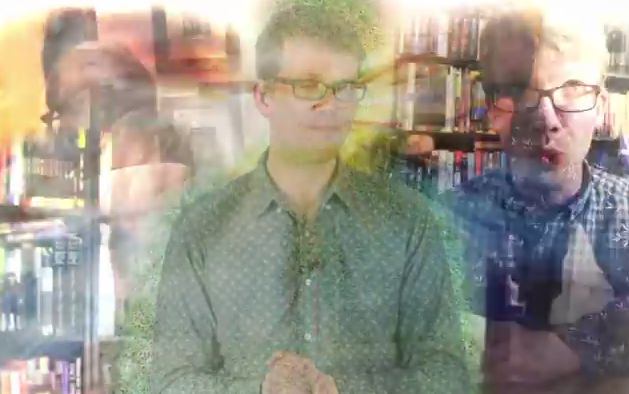Also, waiting around for people to start dying? Not a super-fun job.
But even though they're hard to study, there are tons of ideas about what could cause these experiences,
and they're probably not just caused by one thing.
because they're actually having similar experiences, they see and feel them because they expect to.
This kind of thing happens all the time, like in eyewitness testimonies.
the cliches about near-death experiences might impact what people actually see and feel during them.
Another view is that they are a psychological response to the threat of death.
Beginning in the 1930s, psychologists suggested that these experiences were a result of depersonalization,
where you feel detached from your identity and what's happening to you.
Basically, you know you're dying, but you feel completely detached from it. It's like it's not real.
Among other things, that would also explain why near-death experiences cause calmness and peacefulness.
where your consciousness seems independent from your real, physical experience, is actually to blame.
你的意識(shí)似乎與你真實(shí)的身體體驗(yàn)脫離,這種解離癥才是罪魁禍?zhǔn)住?/div>
Daydreaming is a totally normal example of this, but an extreme case is an out-of-body experience.
白日做夢(mèng)是這一癥狀的正常例子,但也有靈魂出竅的極端例子。
And there's some evidence to back this one up.
有一些證據(jù)支持這個(gè)觀點(diǎn)。
All kinds of trauma often result in dissociation, so there are tests to clinically identify it.
各種各樣的創(chuàng)傷常常導(dǎo)致解離癥的發(fā)生,因此有臨床試驗(yàn)來(lái)識(shí)別它。
The tests ask responders to identify how often they do things like totally zone out while watching TV
這些測(cè)試要求反應(yīng)者確定他們做這些事的頻率,比如看電視時(shí)開(kāi)小差,
or have no recollection of an important event.
或者不記得某件重要的事情。
A study from 2000 looked at 134 subjects who had come close to death,
2000年的一項(xiàng)研究調(diào)查了134名曾接近死亡的受試者,
96 of whom had had near-death experiences.
其中96人有瀕死體驗(yàn)。
They found that the experiencers scored much higher on the dissociation test,
研究人員發(fā)現(xiàn)這些體驗(yàn)者在解離癥測(cè)試中得分更高,
meaning they were more prone to mentally check out of situations.
也就是說(shuō),他們更傾向于精神不在狀態(tài)。
It's also possible that near-death experiences could be entirely or partly biological,
瀕死體驗(yàn)也有可能完全或部分是由生理因素導(dǎo)致的,
and there are a number of possible mechanisms that could explain the things experiencers see and feel.
有很多可能生理機(jī)制可以解釋體驗(yàn)者看到和感受到的東西。
For instance, the combination of fear and depriving the optic nerve of oxygen has been known to cause tunnel vision.
例如,眾所周知,恐懼與視神經(jīng)缺氧一起會(huì)導(dǎo)致隧道視覺(jué)。
And, when faced with the extreme stress of dying,
而且當(dāng)人們面對(duì)死亡的極端壓力時(shí),
the brain probably releases all kinds of chemicals to protect itself, which can lead to those other weird symptoms.
大腦可能會(huì)釋放各種各樣的化學(xué)物質(zhì)來(lái)保護(hù)自己,這可能會(huì)產(chǎn)生其他奇怪的癥狀。
A 2004 study showed that out-of-body experiences can be triggered by stimulating the temporoparietal junction,
2004年的一項(xiàng)研究表明,離體體驗(yàn)可以通過(guò)刺激顳頂交界處觸發(fā),
a part of the brain that plays a role in processing information from your environment
顳頂交界處是大腦的一部分,它在處理環(huán)境信息
and in distinguishing between yourself and others.
以及區(qū)分自己和他人中發(fā)揮作用。
Experiments with an anesthesia called ketamine have also suggested that,
用一種叫做氯胺酮的麻醉劑做得實(shí)驗(yàn)也表明,
under stress, the brain might release neurotransmitters that cause detached, dreamlike states or hallucinations.
在壓力下,大腦可能會(huì)釋放神經(jīng)遞質(zhì),導(dǎo)致分離、夢(mèng)幻狀態(tài)或幻覺(jué)的產(chǎn)生。
And other studies have shown that stimulating a part of the midbrain called the locus ceruleus can release noradrenaline,
其他的研究已經(jīng)表明,刺激中腦一個(gè)叫藍(lán)斑核的部位可以釋放去甲腎上腺素,
which is involved in fear and stress reactions and can alter your emotions and memories.
后者參與恐懼和壓力反應(yīng),可以改變你的情緒和記憶。
Both of those processes could be related to peaceful emotions, hallucinations,
這兩個(gè)反應(yīng)都與平和的情緒、幻覺(jué)
and that sense of your life flashing before your eyes.
以及生命體在你眼前閃現(xiàn)的感覺(jué)有關(guān)。
So it's possible that near-death experiences are caused by a combination of all of these factors, biological and otherwise.
所以瀕死體驗(yàn)可能是由所有這些因素——生理因素和其他因素共同造成的。
Of course, there are critics of these studies, and they make a good case.
當(dāng)然,這些研究也有批評(píng)者,他們舉了一個(gè)不錯(cuò)的例子。
They argue that, if these are normal biological mechanisms associated with the stress and trauma of death,
他們認(rèn)為,如果這些是與壓力和死亡創(chuàng)傷相關(guān)的正常生理機(jī)制的話,
why doesn't everyone who almost dies have them? We don't know.
為什么不是每個(gè)瀕死之人都有呢?我們不知道。
But for people who do have them, there are a whole bunch of scientific explanations for where they might come from.
但是對(duì)于有這些的人來(lái)說(shuō),有很多科學(xué)解釋可以說(shuō)明它們的來(lái)處。
And whether they're caused by biology, psychology, or something in between,
不管它們是由生物學(xué)引起的,還是心理學(xué)引起的,還是兩者共同引起的,
near-death experiences can teach us a lot about how our brains work and that weird thing that we call "consciousness".
瀕死體驗(yàn)都可以告訴我們很多關(guān)于大腦的工作方式,以及我們稱(chēng)之為“意識(shí)”的奇怪事物方面的內(nèi)容。
Thanks for watching this episode of SciShow Psych, brought to you by our patrons on Patreon.
感謝您收看本期的心理科學(xué)秀,它是由Patreon贊助播出的。
If you'd like to help support the show and help us keep making episodes like this one,
如果你想支持本節(jié)目,并幫助我們繼續(xù)制作這類(lèi)節(jié)目,
you can go to patreon.com/scishow.
可以登錄patreon.com/scishow。
We very much appreciate everybody who does that.
我們非常感謝每一個(gè)這樣做的人。












